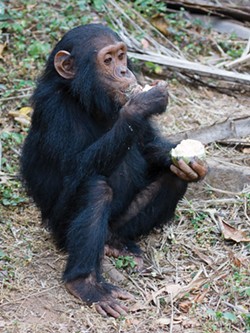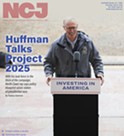[
{
"name": "Top Stories Video Pair",
"insertPoint": "7",
"component": "17087298",
"parentWrapperClass": "fdn-ads-inline-content-block",
"requiredCountToDisplay": "1"
}
]
Last week, I discussed how cooking morphed us from ape to human by increasing the amount of energy we obtain from food, according to anthropologist and primatologist Richard Wrangham. Before cooking was invented, he says, we were essentially apes. After, we were on our way to becoming who we are today, with our comparatively small teeth, jaws, mouths, stomachs and colons, and — crucially — large brains.
When heated, raw meat and starchy plant matter become much easier to digest; from our bodies' point of view, cooked food is energy-efficient food. While the primates from whom we are descended spend most of their waking lives chewing fiber, we devote less than an hour a day to actually eating. According to this scenario, once our ancestors tamed fire and invented cooking, some 1.9 million years ago, human evolution took off, beginning with almost-modern-looking Homo erectus. Today, our bodies are thoroughly adapted to cooked food.
Wrangham says the cooking revolution did much more than improve our ancestors' diets. Once they no longer needed to chew for hours, they had time to kill. Literally. The men went hunting for hours or even days, in contrast to, say, chimpanzees, who revert to low-calorie plant food if they haven't killed in the first half hour. In addition to lengthy hunting expeditions, cooking led to huge social changes. Most animals, including our simian cousins, wander around alone and eat where the food is. When humans started cooking, they brought the food to the fire, requiring them to sit around and cooperate — or at least not fight, as chimps, for instance, do as a matter of habit. To successfully socialize in a community, human temperaments had to grow calmer.
Another significant effect was the establishment of gender roles. While men hunted, women foraged and cooked. What was to stop a hungry man from stealing food from a woman? Pair bonding. A woman needed a man to protect her and her offspring, while a man needed a woman to cook for him at the end of the day. Thus was born the modern family structure.
Not that the fire-and-cooking combo brought only light and love, so to speak. Fires probably led to the emergence of many infectious diseases, which evolved and spread when people spent time in close contact. Tuberculosis, for instance, which has probably killed a billion people over the millennia and still claims more than a million lives every year.
While the cooking-made-us-human theory has plenty going for it, one major piece of the puzzle is missing: archeological evidence that humans controlled fire 1.9 million years ago. Most researchers agree that we have good evidence for hearths (in the form of burnt wood ash associated with human habitation) going back at least 250,000 years. Beyond that is where the controversy begins, especially with a recent claim of fireplaces in Kenya that are 1.6 million years old, according to potassium-argon analysis.
Apart from the lack of undisputed evidence for controlled fire 1.9 million years ago, other anthropologists say the critical step in our evolution was when we started eating raw meat, perhaps a million years earlier. (We have evidence of 2.5 million-year-old cut marks on large animal bones.) However, the really profound anatomical changes all began no earlier than when Homo erectus emerged nearly 2 million years ago. The verdict is still out, but right now Wrangham's "cooking" claim appears a worthy competitor in the competing theories of how and why apes evolved into humans.
Barry Evans ([email protected]) recommends Richard Wrangham's book Catching Fire for those hungry for more on
this topic. It's in the Humboldt
County Library.
more from the author
-
Rise and Fall of the "Sunshine Vitamin," Part Two
- Jul 11, 2024
-
Rise and Fall of the 'Sunshine Vitamin,' Part One
- Jul 4, 2024
-
The Myth of the Lone Genius
- Jun 6, 2024
- More »

































